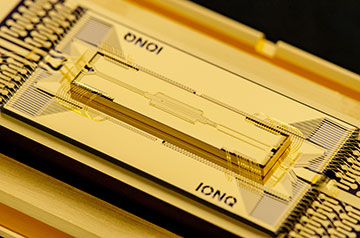
Photo of ion trap. [Image: Courtesy of IonQ]
In a flurry of early-November announcements, quantum-computing developer IonQ, USA, unveiled a number of partnerships and an acquisition following robust third-quarter growth. Specifically, on 7 November, the company revealed collaborations with the Belgium-based R&D center imec and laser and fiber optic systems manufacturer NKT Photonics, Denmark, a subsidiary of Hamamatsu Photonics, Japan, to advance optical elements of its hardware.
A day earlier, on 6 November, IonQ announced a partnership with the software company Ansys, USA, to integrate quantum computing into the US$10 billion computer-aided engineering industry. It also divulged its acquisition of the quantum-networking company Qubitekk, Inc., USA.
These developments follow on the heels of IonQ signing a US$54.5 million deal with the US Air Force Research Laboratory (AFRL) in September, accelerating its expansion into the US$15 billion quantum-networking market.
“We had yet another banner quarter at IonQ, booking US$63.5 million and exceeding the high end of our revenue range,” said Peter Chapman, IonQ’s president and CEO. “We are thrilled to be at a major inflection point for the company and the industry.”
PICs and ion-trap tech
In partnership with imec, an R&D center in nanoelectronics and digital technologies, IonQ is developing photonic integrated circuits (PICs) and chip-scale ion-trap technology, with the goal of pushing the boundaries of performance in quantum computing.
Traditional trapped-ion quantum computing approaches rely on bulk optics for laser light modulation, delivery and photon collection. By moving from bulk components into PICs, IonQ is looking to reduce hardware system size and cost, increase qubit count and improve system performance. The company believes chip-scale optical technologies and IonQ’s integration with imec’s trap manufacturing and packing will lead to new capabilities, increased reliability, reduced cost-per-qubit and faster time to market for new generations of quantum computers.
Through this partnership, NKT Photonics will develop and deliver three prototype optical subsystems to IonQ in 2025 to support the commercialization of IonQ’s data-center-ready quantum computers.
“Adding imec to IonQ’s set of fabrication and technology partners will have a profound impact on our ability to increase the computational power of our quantum computers through the co-development of compact, high-performance electro-optical systems,” said Dean Kassmann, IonQ’s senior vice president of engineering and technology.
Next-gen laser systems
The aim of IonQ’s collaboration with NKT Photonics is to procure next-generation laser systems for IonQ’s trapped-ion quantum computers and networking equipment. Through this partnership, NKT Photonics will develop and deliver three prototype optical subsystems to IonQ in 2025 to support the commercialization of IonQ’s data-center-ready quantum computers, including IonQ’s forthcoming “tempo” computers and future barium-based systems.
NKT Photonics’ systems are based on fiber-laser technology. According to IonQ, these lasers provide an advantage in performance, cost, lead time and SWaP (size, weight and power). Additionally, they will be modular and rack-mountable, the company said.
“We are pleased to partner with NKT Photonics, as they share IonQ’s vision of developing high-performing, scalable and accessible quantum computers designed for enterprise data center environments,” said Dave Mehuys, vice president of product engineering at IonQ.
Meanwhile, President and CEO of NKT Photonics Basil Garabet had this to say: “We look forward to partnering with IonQ and supplying them with our unique laser solutions to advance the quantum-computing frontier.”
Leveraging multiphysics technology
IonQ joined forces with Ansys to make simulation accessible to both quantum experts and non-experts, with the goal of enhancing enterprise value and streamlining product development processes. The company plans to rely on Ansys’ multiphysics technology—which includes structural, optical, photonic and electromagnetic simulation software—to design and optimize key components for scalable quantum computers.
As part of the transaction, Qubitekk’s executive team and employee base—including physicists, engineers, software developers and others—will join IonQ to further drive quantum-networking efforts.
“We are excited to work with IonQ to create a new generation of quantum-based solvers that could simultaneously increase predictive accuracy and expedite simulation run time,” said Prith Banerjee, chief technology officer at Ansys.
Qubuitekk acquistion
Finally, IonQ announced that it reached a definitive agreement to acquire the operating assets of Qubitekk, Inc., a California-based quantum-networking company. As part of the transaction, Qubitekk’s executive team and employee base—including physicists, engineers, software developers and others—will join IonQ to further drive quantum-networking efforts. IonQ’s leadership anticipates closing the acquisition within the next six months.
According to IonQ, the deal will expand its quantum-networking expertise and technology portfolio with 118 US and international patents in the areas of quantum-networking hardware and quantum network security and protection.
It’s been a busy year for IonQ. In addition to these developments and the company’s recent contract with AFRL, IonQ opened its first manufacturing facility in the United States capable of producing quantum computers for customers’ data centers. It also delivered its first overseas ion trap to its European quantum data center and demonstrated remote ion–ion entanglement.
“These announcements advance our position as a market leader in quantum networking, in addition to our pole position in quantum computing,” said CEO Peter Chapman.
